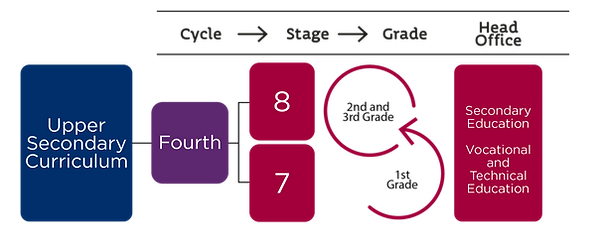STUDY
EDUCATIONAL SYSTEM
The Uruguayan educational system is based on a secular and mandatory system with free access to education for all citizens.
Uruguay was the first country in the world to implement One Laptop Per Child through the Ceibal Plan, ensuring connectivity and access to content for all children in the country’s public education system.
Uruguay´s education system is based on a Comprehensive Curricular Framework (MCI), a competency-based curriculum model focused on connecting learning with real life, taking into account social, cultural, and technological changes. It is divided into Integrated Core Curriculum (EBI) and Upper Secondary Curriculum (EMS).
Uruguay simplifies the processes of recognition and validation of studies obtained at all levels, both in the public and private system. For further information you can access the Center for advice to migrants regarding educational issues of the Ministry of Education and Culture of Uruguay, where advice is available concerning the functioning of the entire educational system, its range of services and places where enrollment and revalidation procedures can be carried out.
Early Education
Early childhood education covers the period from birth to three years of age. In Uruguay, it is not compulsory.
The purpose of early childhood education is to stimulate the affective, social, motor, and intellectual development of children. Education is mandatory from age 4 or, at the latest, 5. There are a series of both public and private options.
To enroll children, it is necessary to go to any educational center and present any form of ID for the child (ID card, birth certificate or passport) and their Health and Vaccination Card.
In Uruguay, there are both public and private Early Education Centers. You can explore the range of private institutions by clicking here.
The Childhood and Family Care Centers (Plan CAIF) aims to ensure the protection of children from 0 to 3 years old, with a focus on those from families facing poverty or social vulnerability. Learn more by clicking here.
Integrated Core Curriculum (EBI)
Comprehensive Basic Education consists of three stages, each with a clearly defined student graduation profile. It includes nine grades covering ages 4 to 15 and it is mandatory.
From 1st to 6th grade, the Preschool and Primary Education Head Office (DGEIP) is responsible for implementing the MCI, while the Secondary Education Head Office (DGES) and the Vocational and Technical Education Head Office (UTU) oversee 7th, 8th, and 9th grade.
In order to enroll children, they must go to the school of their choice with a form of ID (ID card, birth certificate or passport) and their Health and Vaccination Card.
Access here to the list of public schools throughout the country and here to the list of private schools throughout the country and in the website www.vacanted.com.uy
In the following link you can access the programs for early and primary education available in the country.
Upper Secondary Curriculum (EMS)
It refers to the last three grades of compulsory education in Uruguay, starting with a first year that continues with the Comprehensive Curricular Framework. After that, students can choose between a technical-vocational education program focused on entering the workforce, or a diversified high school track that prepares them for higher education.
There is also a tertiary level education option and professional training courses in different areas of activity, held at the Universidad del Trabajo de Uruguay.
To learn more about the secondary school revalidation system, click here. Generally, the following is required to start the process:
-
Uruguayan ID card or an ID from any of the member countries of the Mercosur or a passport (original and copy).
-
Certificate of completion of studies duly legalized and translated.
Tertiary Education
Tertiary education has a diverse range of educational offers and is organized into three levels:
-
Non-University Tertiary Education, which deepens and broadens training in some areas of knowledge.
-
Training in Education, which seeks to train teachers, technical teachers, professors, physical education teachers and social educators.
-
University Tertiary Education, which is aimed at undergraduate, postgraduate and master’s degree training in different areas of knowledge.
The Technical Professional Education Council (CETP/UTU for its acronym in Spanish) contains the largest number of public tertiary education offers in terms of technical courses.
In all cases for the revalidation of studies, the following is required: degrees, certificates and certified grades, apostilled for use abroad. Find more information here.
Click here to learn more about Uruguay's university education offers.





